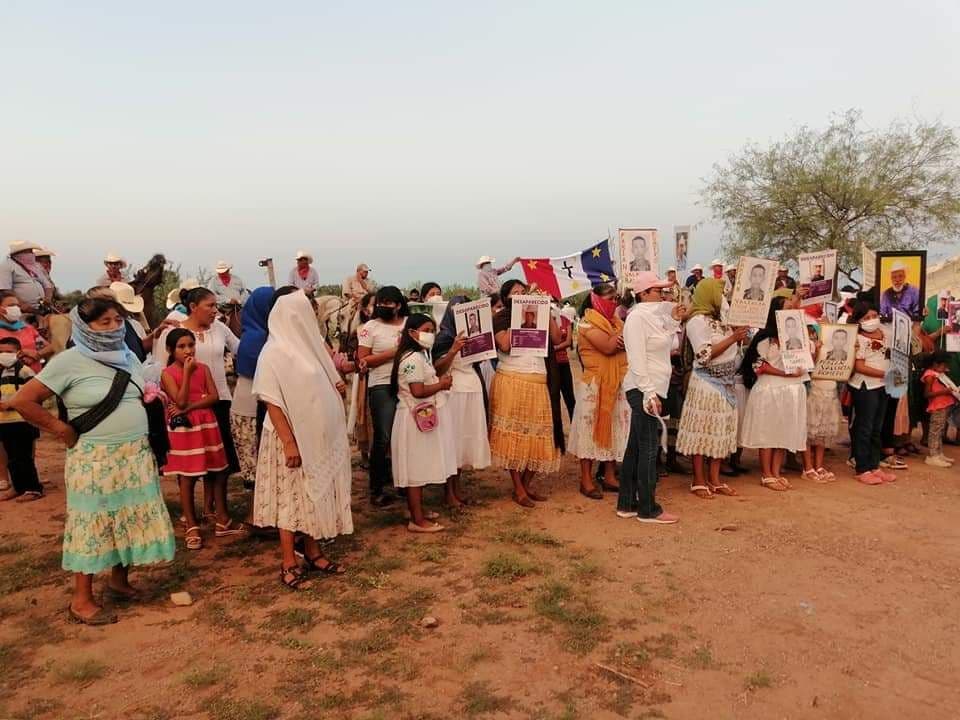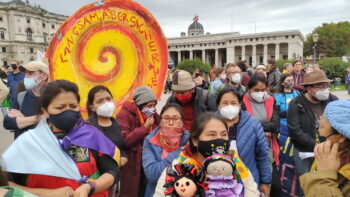
Autonomy and Resistance
Communities and Collectives of Oaxaca Denounce the State-Organized “Indigenous Encounters Canada-Oaxaca 2021”
Communique from communities and collectives of Oaxaca denouncing the state-organized “Indigenous Encounters Canada-Oaxaca 2021,” and calling for the construction of affinity and reciprocity between Indigenous peoples of so-called Mexico and Canada through solidarity and resistance
To the Media
To the General Public
To our Brothers and Sisters of Turtle Island
Within the context of the “Indigenous Encounters Canada-Oaxaca 2021,” a celebration organized by the Canadian and Mexican states taking place from September 20 to October 8 in Oaxaca City, we have decided share some relevant information that has been omitted and misrepresented in the official announcements and press conferences for the event.
What they call the “state of Oaxaca” is one of the most culturally and linguistically diverse places in the world, thanks to the ongoing Indigenous resistance against extermination, which began with European expansion into the territory now known as Mexico. It is this very diversity which the governments of Oaxaca and Canada figure as the principal motivation to carry out this event.
However, what they call diversity is much closer to Mexican nationalism, constructed with the blood and bones of our ancestors. The reason for this is that the governments see the Indigenous and the Afro as a profitable cultural expression, as a discourse, as an image, etc.
We, those who for generations have resisted their necropolitics, racism, classism, and sexism, not only refuse to nurture that nationalism, but we also repudiate the commodification of our life forms. We want all those who prefer to ignore reality to know that for generations we have witnessed the expulsion and marginalization of Indigenous people in the territory invaded and now called Oaxaca. We have been subject to the dispossession of our lands, which we watch with sadness and rage as they are converted into objects of financial speculation.
If we have anything to share with our brothers and sisters from Turtle Island, it is this history of pain and colonial violence. They too were dispossessed, massacred, and forced to live on reservations. What they call “Canada” hides under its soil thousands of bodies of Indigenous children, men and women, assassinated for the misfortune of not being white and not thinking like whites. Although the state tries to hide it, this violence endures and manifests in different ways.
This shared history of dispossession invites us on this occasion to say in unison, to those whose laws justify or facilitate Indigenous extermination, to those who confuse our history of resistance with folklore, and to those who hide their business interests behind the expression of “cultural fraternity,” WE WILL NOT ALLOW IT, NEITHER MATERIALLY NOR SYMBOLICALLY.
WE DENOUNCE that these same people have been the masterminds of the worst environmental and social tragedies that we have seen in recent times. An example of which is the installation of mines for mass mineral extraction, through the exploration and implementation of mining concessions and mining projects.
(Español) Canadá y Oaxaca simulan hermandad con pueblos indígenas
Por Ñanì Pinto
En portada: Manifestación realizada en Oaxaca por comunidades indígenas en contra de la minera Cuzcatlán, filial de la canadiense Fortuna Silver Mines. Foto: Santiago Navarro F.
A unos días de concluir el evento denominado ‘Encuentros Indígenas Canadá-Oaxaca 2021’ organizado por el gobierno de México y Canadá entre el 20 de septiembre y el 8 de octubre de 2021, diversos pueblos, colectivos y comunidades indígenas de Oaxaca se deslindaron y denunciaron una “simulación de hermandad” con la que se pretende “desviar nuestra atención de los problemas estructurales y las situaciones de despojo y saqueo de las que pretenden hacernos objeto”.
En un posicionamiento firmado el 29 de septiembre por autoridades de San Pedro Apóstol y San Pedro Mártir, Ocotlán y de Capulálpam de Méndez, así como por las comunidades El Rebollero, Río Minas y Los Arquitos, San Pablo Cuatro Venados, Zaachila, se advierte que “el Estado Canadiense y el Estado Mexicano, a través del gobierno de Oaxaca, pretenden lavar sus rostros en lo que respecta a su relación colonial con las comunidades indígenas y afros”.
Comuneros, comuneras y pobladores hacen un recuento del dolor y la violencia colonial que han sufrido los pueblos y comunidades indígenas de ambos países, desde el reciente descubrimiento en Canadá de fosas con cientos de cuerpos de infantes en antiguos internados para niñas y niños indígenas, hasta las concesiones mineras en México que han sido otorgadas a empresas canadienses en tierras comunales sin el consentimiento de los pueblos, las cuales han causado conflictos socioambientales que han provocado el asesinato de defensores y la contaminación impune de ríos y suelos.
Te puede interesar → Minera Cuzcatlán: Con licencia para contaminar
“Según datos del Observatorio de Conflictos Mineros de América Latina, en México, el 50% de los conflictos mineros está relacionado directamente con empresas canadienses; de acuerdo con información contenida en el Sistema Integral Sobre Economía Minera, de las 242 empresas extranjeras con proyectos mineros en el país, 160 corresponden a Canadá; además de que el 74% de las concesiones para explotación mineras son otorgadas a empresas de dicho país” recalcan.
El comunicado también es firmado por el Comité Ixtepecano en Defensa de la Vida y el Territorio, el Espacio de Mujeres en Defensa de la Madre Tierra “Las Meñas”, el Colectivo Matza, San Miguel Chimalapas y la Articulación Por la Vida, Contra la Minería en el Valle de Ocotlán.
En el documento, los colectivos y las comunidades que han vivido en carne propia el embate de megaproyectos de capital extranjero con la anuencia de las autoridades locales, advierten que no le van a permitir ni material ni simbólicamente el avance “a quienes con sus leyes justifican o facilitan el exterminio indígena (…) a quienes confunden nuestra historia de resistencia con folklor y a quienes ocultan sus negocios tras la expresión “hermandad cultural”.
Los “Encuentros Indígenas Canadá-Oaxaca 2021” surgieron “gracias a la invitación del Presidente de México, Andrés Manuel López Obrador, al Primer Ministro de Canadá, Justin Trudeau, a sumarse a las diferentes conmemoraciones que México celebra este 2021”. Así lo establecen en su página web. “En ese contexto, se decidió hermanar al pueblo de Canadá con el pueblo oaxaqueño”.
Mientras tanto, las comunidades señalan que se encuentran en alerta máxima ante este acto de simulación de hermandad. “Sabemos que sus intereses son y serán siempre otros. Los lazos de afinidad y reciprocidad con lxs indígenas de Isla Tortuga los tejeremos nosotrxs, con el objetivo de extender nuestra resistencia, hasta que las praderas, montañas, ríos y animales vuelvan a ser libres, hasta que la resistencia nos permita vivir con dignidad, y no a la sombra de un deber ser impuesto y construido por aquellos que duplican sus inversiones gracias a nuestro exterminio”, finaliza el documento de denuncia.







